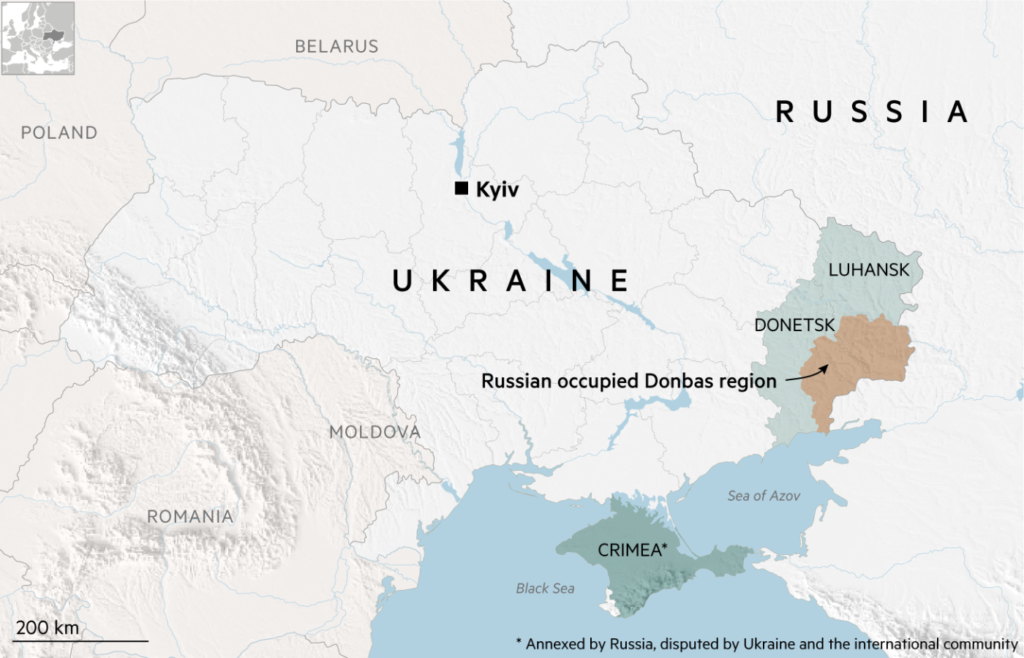Is the Kremlin Ready to Move Against Ukraine?
Some U.S. officials are very worried that Russia is preparing a new offensive against Ukraine. The major reason, of course, is the recent buildup of troops – now totaling, according to reports, at least 90,000 – near the border. But there are other factors at work. The New York Times reports that:
American intelligence officials have told allies that Mr. Putin has grown frustrated with the peace process set up by France and Germany in 2014 after Russia annexed Ukraine’s Crimean Peninsula and engineered a separatist rebellion in eastern Ukraine.
Some former officials say Mr. Putin could be intent on securing a land route between eastern Ukraine and Crimea. And American analysts believe Mr. Putin sees the next few months as a unique moment to act.
With Chancellor Angela Merkel of Germany leaving the world stage, there is less pressure on Ukraine to make concessions. Without a coalition in Germany, there is little leadership in Berlin.
Rising energy prices have made Europe more dependent on cheap Russian gas supplies, especially as winter deepens and gas reserves in Europe drop further. Fear of losing access to Russian energy could limit Europe’s support of tough sanctions.
Russia has already begun manipulating energy supplies in Europe, a Western official based in Brussels said. When energy prices rise, the official said, Mr. Putin feels he has more latitude to act.
And with rising prices and limited supplies, Russia has more money to pay for military operations, according to current and former officials.
The Associated Press is a bit less breathless:
The buildup of Russian troops near Ukraine has left U.S. officials perplexed, muddying the Biden administration’s response…. Though U.S. officials don’t believe an invasion is imminent, Putin also has ramped up his dismissal of an independent Ukraine. A lengthy essay the Kremlin published in July asserts that Ukrainians and Russians are “one people” and the “true sovereignty of Ukraine is possible only in partnership with Russia.”
But the moves could also be saber-rattling to prevent Ukraine from growing closer to the West or being admitted into the North Atlantic Treaty Organization, which Putin strongly opposes. It’s not clear if Russia would risk invading Ukraine, setting off a far more difficult war, or want to occupy hostile territory.
A similar Russian military buildup in the spring did not lead to an invasion, though lawmakers and officials say they are more concerned now, citing U.S. intelligence that has not been made public.
I don’t have any great insights here.
Word on the street is that military action may very well be coming. If the Kremlin does order a new invasion, then we should expect to see additional efforts by NATO and Russia to signal resolve. It’s not inconceivable that these efforts could result in, say, aircraft or naval vessels firing on one another. But I wouldn’t expect to see further escalation.
The most likely response from the U.S. and NATO is to do more of the same. New sanctions. More deployments in Poland, the Baltic States, or Romania. Closer cooperation with Ukraine and Georgia. In short, if Russia invades it will likely find itself in a worse position than it is now.
The same is not necessarily true for the its government, which has become increasingly authoritarian over the last few years. Putin may believe – and with good reason – that trends in Ukraine are against him. Instead of forcing Kiev back into Russia’s orbit, the 2014 invasion turned the country into an EU and NATO client state; both Crimea and the breakaway “republics” are drains – both direct and via sanctions – on Russian resources. When the status quo seems bad, it’s much easier to discount downside risks.
Americans tend to equate the use of force with strength. It’s often, instead, a sign of weakness – an inability to get favorable outcomes through less risky and cheaper means. That doesn’t make the situation less dangerous, but it does put it in perspective.
(It’s worth noting that this tendency to overvalue military instruments is also a bit ironic, given anxiety about the rise of Chinese global influence. Beijing achieved its current position entirely through the use of non-military instruments. Yet Republican “China hawks” have done little to address chronic U.S. underinvestment in diplomacy, foreign aid, and other power resources.)



